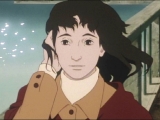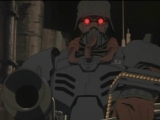

Quick Links:
Jin-Roh, The Wolf Brigade
Jin-Roh is a mixed blessing for the world of anime. It's one of the most beautiful films to ever grace the big screen; however, it falls victim in part to cookie-cutter storytelling. Not to be denied though is the fact that the film is intriguing and immersive. It is appealing on many levels, thanks to intelligent direction. The film is very deep and contains adult themes, so it's not for children. It is, however, a good educational experience for the family.
Jin Roh is a rumor, of a secret organization which may or may not exist. They are said to have influence over the major divisions of the Capital Police and Local Police organizations. The film is set in Japan somewhere between 1955 and 1965, and is meant to closely model the social unrest of the time. It opens as rioters crowd the streets of the capital, and local police attempt to keep the rioters at bay. The rioters are supported with explosives by an organized crime group called the Sect. Meanwhile, below the city, the Special Unit of the Capital Police seeks out and engages Sect members that are using the sewers to transport munitions. One of the transporters is a teenage girl, who carries a powerful explosive in her satchel. She is intercepted by a member of the special unit named Kazuki Fuse, who watches as she blows herself up.
The remainder of the story follows Fuse as he deals with his experience, and politicians attempt to use him as an excuse to shut the Special Unit down. His chance meeting with the sister of the girl who killed herself complicates things further. The story of Jin Roh uses Little Red Riding Hood (Rotkäppchen) as a plot device, and alludes to it often. Way too often, in fact. The little red riding hoods are the young girls that the sect uses to deliver the powerful explosives, and the wolves are those who manipulate them. The dialogue in the film constantly reflects on the differences between man and beast, and relates it back to Rotkäppchen. The frequency of allusions actually serves to hurt the film's artistic statement instead of help it. Aside from the overfrequent allusions, Jin Roh's story progression and dialogue are top notch. Some will find the film's slow pace a bore, and others will enjoy being able to keep up with its complex political situation.
There are two areas in which Jin Roh really shines, and one of those is in its character design and animation. The characters are made to look real, as is the world around them. The little red riding hoods are dressed appropriately, and the members of the Capital Police Special Unit wear gear that makes them look like wolves. The real wolves, however, hide in the shadows and look just like everyone else, as in the story which Jin Roh alludes to. The animation is fluid and clean throughout the film, and a wonderful job was done with the lighting effects. Action scenes, though few and far between, are exciting.
The other area in which Jin Roh displays exceptional quality is its music. The songs are paced well with the actions in the movie, and are incredibly immersive. Jin Roh's soundtrack doesn't suffer from the annoying repetitiveness that many movie soundtracks do. This is not to say that there's no repetition in the music, but that its trespasses on and through the film's experience are subtle enough that you don't really notice the repetition. The same goes for listening to the soundtrack on its own, because the accents to the melody are what drives the music, not the melody itself. The soundtrack was composed by Hajime Mizoguchi, who was also involved in the Escaflowne soundtracks. The vocal performance and lyrics of the ending song, "Grace", were done by Gabriela Robin (who most believe to be Yoko Kanno).
There are two editions of Jin-Roh: the regular DVD edition and the special edition. The regular edition has no extras, save trailers for other Bandai and Viz distributed features. The special edition, on the other hand, has enough extras to keep a person busy for quite some time. The disc containing the movie is the same as in the regular edition. There is also an extras disc, with an expansive image gallery, interviews covering several aspects of the production, and 5 trailers for the film (4 in Japanese, 1 in English). As if that were not good enough, the special edition also contains the film's soundtrack, which alone makes up for the added cost. Lastly, the special edition contains a mini-filmography of Mamoru Oshii up to and including Jin-Roh, and a chart showing things that could spoil the movie for you, so watch it first. The regular edition contains only the chart in the insert. Both of Jin-Roh's vocal tracks (Japanese and English) are expertly done, and blend well with the mood of the film. The English track is available in Dolby 5.1 Surround, and the Japanese track can be played either in Dolby 5.1 Surround or DTS 5.1.
What will draw people to Jin Roh is its honesty, and its shocking view of human nature. Some may be turned off by its constant allusions to the old Grimm fairy tale, but the stellar animation and music make the film more than worthy of a view.
Distributor: Bandai / Viz Video Creator: Bandai Visual / Production I.G. Released: 2001
Plot: B+ Character Design: A Animation Quality: A+ Music: A+ Overall: A



